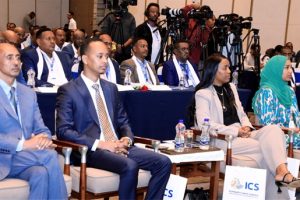
ADDIS ABABA – Ministry of Industry (MoI) stated that the revised industrial policyof Ethiopia is instrumentalto balance export and import trades.
The Ministryhas heldanawareness creation event yesterdayfor stakeholders to make the policy effective together.
In his opening speech, Minister of Industry, Melaku Alebel said that the revised industrial policy is inclusive, market oriented and considers global context.
Therevised policy is created relying on two pillars that enable the manufacturing sector to produce inputs at home and increase production so as to reduce reliance on imported goods, he mentioned.
The policy promotes financial support and accessibility for manufacturing industry and startups, according to the Minister.
As to him, a well regulated micro-economy and business plays vitalrole to encourage manufacturing industries to become competitive thereby ensure sustainable development utilizingconducive business environment.
The revised policy tries to balance between export and import substitution, Melaku said, adding that with imports surpassing exports by a significant margin, there is a pressing need to narrow the trade deficit by fostering and encouraging local production.
The policy takes into accountthe most commonly imported products in contrast with the nation’s potential resources to achieve the objectives of strengthening domestic manufacturers and achieve self-reliance in industrial products, he indicated.
This policypromotes human resource development and improving working environ to increase Ethiopian product desirability onthe market andpromote development of manufacturing industry, he mentioned.
“Under the revised policy, we have established a committee that supports industries at federal leveltoencourage manufacturers by providing incentives based on their performances.We are working to make our manufacturers competitive in the global market in 6 years. But to achieve this, we need to revise our policies, our human expertise.”
The policy is instrumental in coordinatingof various government entities, including executive bodies at federal and state levels, the manufacturing industry council and the private sector to realize the policy’s objectives, Melaku underscored.
BY MISGANAW ASNAKE
THE ETHIOPIAN HERALD SATURDAY 20 APRIL 2024





